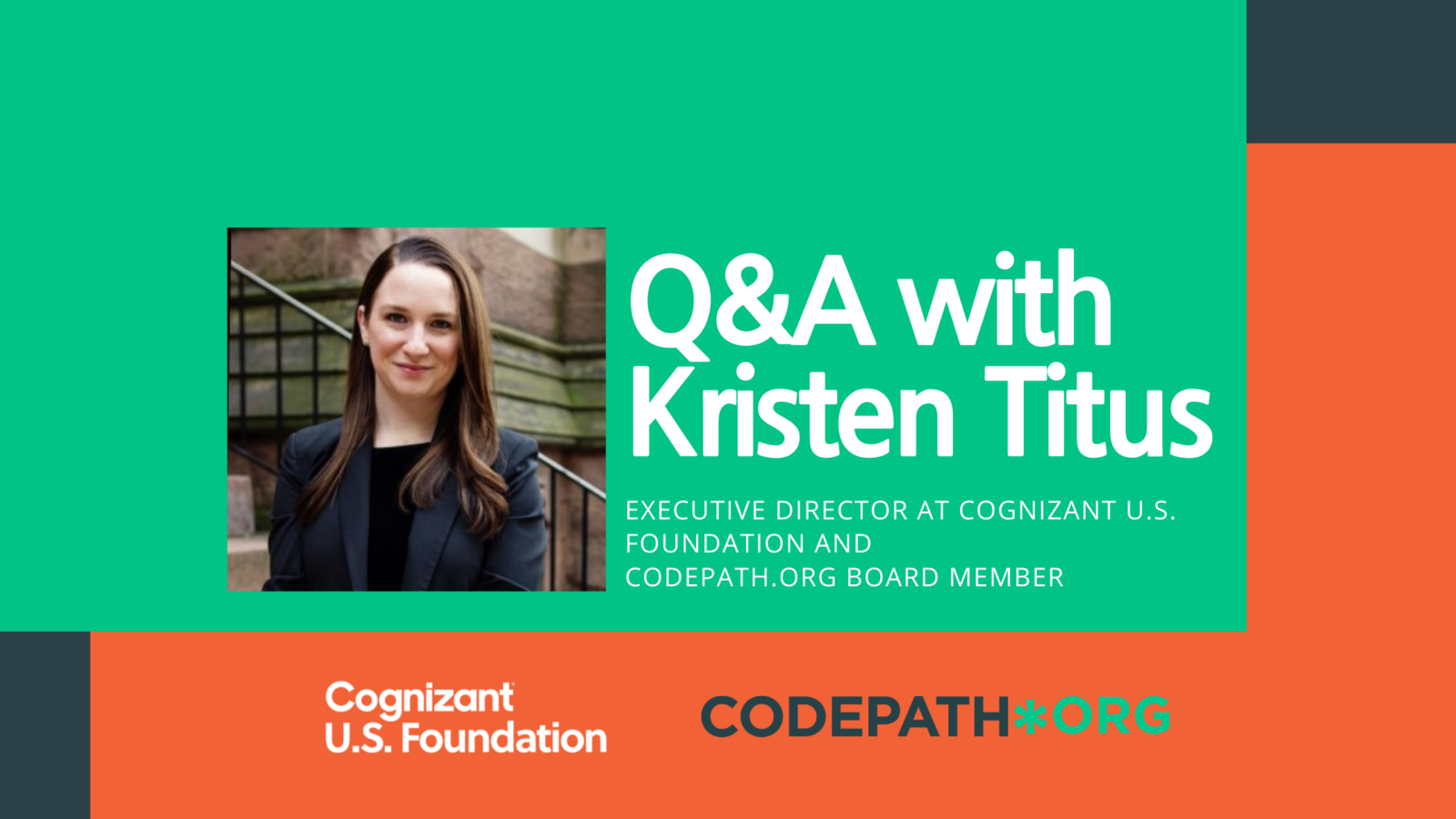A Q&A with Kristen Titus, Our Board Member
CodePath is thrilled to share that Kristen Titus, executive director of the Cognizant U.S. Foundation has joined our board of directors!

Kristen’s impressive career in the tech industry has included several influential stops along the way, with her work featured in outlets such as TIME Magazine, Business Insider, Forbes, The New York Times and Elle Magazine, to name a few. Currently, as the executive director of the Cognizant U.S. Foundation, she oversees philanthropic investments in education and workforce development initiatives that emphasize equitable outcomes—CodePath is one of the foundation’s grantees.
Previously, she was the chief technology and innovation officer for the state of New York and the founding executive director of the NYC Tech Talent Pipeline. Her work has served as a model for President Obama’s TechHire and CSforAll initiatives, now replicated in 70+ cities. Kristen was also the founding executive director of Girls Who Code, the national nonprofit working to close the gender gap in technology and engineering.
We recently caught up with Kristen to learn more about why she joined CodePath’s board:
How did you first learn about CodePath?
I first met CodePath’s CEO, Michael Ellison, through my work with Girls Who Code. We reconnected when I started at Cognizant U.S. Foundation, and I was impressed to learn about CodePath’s unique approach and rapid growth. In 2019, the foundation—alongside Walmart.org and Microsoft Philanthropies—collectively invested $3 million to help the organization reinvent computer science education at the college level and create pathways into technology jobs for underrepresented groups.
Today, CodePath’s programs reach 10,000 students across 200 institutions, and over 50% of its students are from underserved communities. Its Career Center connects students to the industry, and offers services including mock interviews, resume reviews, workshops and events. It also offers students a technical mentorship program and Virtual Career Fairs throughout the year that connect students with major tech employers. And, we’re happy to have recently announced a renewed investment of $2.5 million to scale this work.
Tell us more about why this work is so important in today’s environment. Why this, why now?
As we continue on the journey to economic recovery, it’s important to analyze how and who is gaining access to tech careers—our nation’s number one source of new wages. A lucrative career in software engineering is a surefire path to economic mobility—and yet, access to these tech careers is inequitable.
CodePath plays a critical role equipping young people with the skills needed to secure job opportunities that lead to economic mobility. Its programs help students of color access high-quality computer science education, technical internship experience, and career supports that, little by little, are transforming the old pathways into the tech industry, which have primarily been based on pedigree and privilege.
Persistent underrepresentation in the tech industry has very real consequences for society—encoding racism into the very technology that powers our everyday lives and widening income inequality for already marginalized communities. It is imperative that we create equitable and accessible pathways into high-trajectory, high-income tech careers. Without these new pathways, certain populations will continue to be excluded from the wealth creation possible within the tech ecosystem.
What about CodePath’s work excites you most? What are you looking forward to seeing as a result of both you joining the Board and the Cognizant U.S. Foundation’s investments?
I am most excited about CodePath’s ability to affect real systemic change in the tech industry. A recent analysis showcased the incredible impact to date: CodePath’s Latinx alumni are 19x more likely to work in tech, and Black alumni are 3x more likely to work in tech. 56% of first-generation students who’ve participated in CodePath now work as software engineers or SWE interns. As the organization continues to scale, we expect to see unprecedented accountability from tech leaders, as well as transformed hiring and development practices. That paradigm shift will lead to better job outcomes, and most importantly, increased influence and social capital for underrepresented minorities who have been boxed out of tech careers for too long.